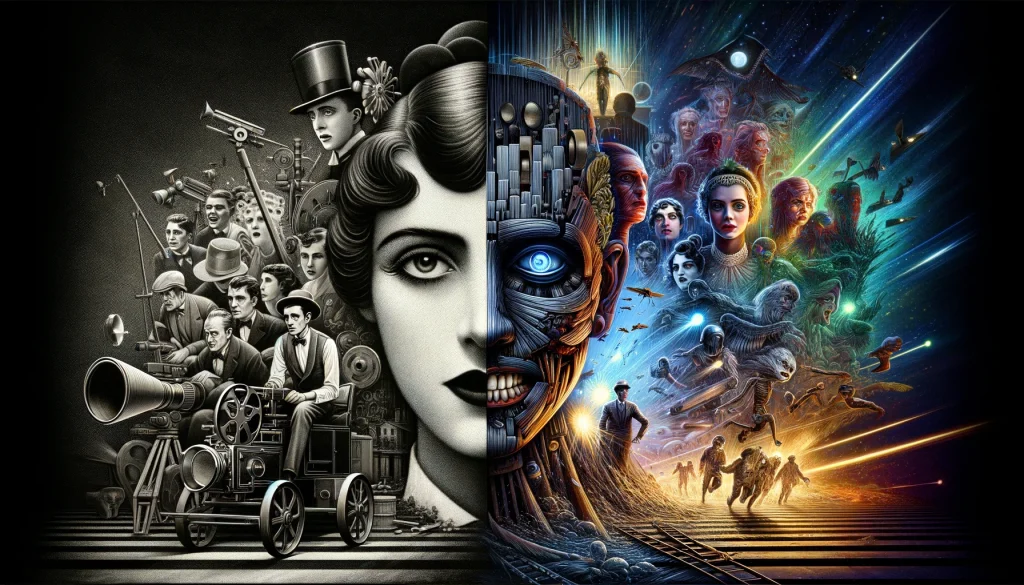The early 20th century saw the advent of a new form of art and entertainment that captivated the world – cinema. As with any groundbreaking development, this too was pioneered by a handful of individuals whose creativity and perseverance laid the foundation of something truly remarkable. These pioneers of silent movies are, in many ways, the unsung heroes of film history.
Silent movies, as the name suggests, were films without synchronized recorded sound. The narratives were primarily conveyed through muted dialogues, mime, and title cards. Even though silent films may seem quaint and outdated in the technicolor world of 4K video that we live now, they were the epitome of entertainment during the era spanning the late 19th and early 20th centuries. The silent era was without a doubt, a time of experimentation, trial and error that shaped the course of cinematic history.
Many film experts argue that silent movies played a significant role in highlighting the importance of visual narrative over audio, teaching us the power of facial expressions, backgrounds, lighting, and costumes in storytelling. Silent films paved the way for emphasizing the aesthetics of cinema, thus making a substantial contribution to the development of the art of film-making.
The realm of silent cinema had many pioneers, but arguably, the most prominent among them was Charlie Chaplin. His iconic character, the “Little Tramp,” has become a symbol of the silent film era. Chaplin didn’t just act; he also directed, produced, and composed the music for his films. His genius lay in his ability to infuse comedy with commentary on social and political issues, making his films not just entertaining but also thought-provoking.
Buster Keaton, another pioneer of this era, was known for his physical comedy that pushed the boundaries of slapstick. He performed dangerous stunts and gags that had audiences both laughing and gasping in awe. His innovative use of props and visual effects also set him apart from his contemporaries.
In terms of production, D.W. Griffith is hailed as one of the unsung heroes of this era. His film “The Birth of a Nation” revolutionized filmmaking with its narrative style and innovative techniques. While the film’s content is widely criticized today for its racist portrayals, there’s no denying the fact that it significantly influenced the future of cinematography.
Apart from male pioneers, women too played a vital part in shaping the silent film era. One such unsung hero is Alice Guy-Blaché, who is considered the first female director in the history of cinema. She is credited with making one of the first narrative films, “The Cabbage Fairy,” in 1896. She explored a variety of genres and always encouraged innovation in her work.
Mary Pickford, popularly known as “America’s Sweetheart,” was not just an actress but also a powerful woman behind the camera. She co-founded United Artists studio and the Academy of Motion Picture Arts and Sciences, both of which continue thriving now. Her business acumen and acting prowess make her an influential figure in early Hollywood.
Though not as recognized as they should be, these silent movie pioneers and many others revolutionized the art of storytelling, acting, and production. They developed unique techniques adopted and adapted by generations of filmmakers. In essence, they set the tone for the narrative and aesthetic elements still prevalent in the industry.
The pioneers of the silent movie era played a significant role in establishing cinema as an art form and a popular medium of entertainment, shaping the fundamental aesthetics of film-making that we know and appreciate today. Their significance extends beyond the silent film era, and their influence can still be traced in contemporary cinema. Not just creative visionaries, they were also trailblazers in a fast-changing, tumultuous world, pushing boundaries in filmmaking and challenging the status quo. Silent movie pioneers are rightfully unsung heroes who should be celebrated for their creativity, courage, and craft — true luminaries of the cinematic world.



